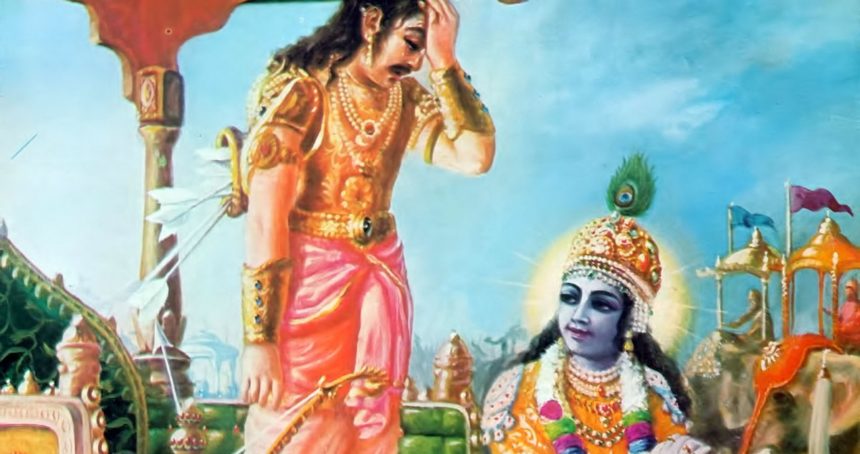Lack of awareness of Svadharma among individuals in a society leads to increased suffering, not just for humans but the whole biosphere.
Svadharma

Each individual has certain roles and responsibilities towards many others. Many have contributed towards what one has and therefore one naturally has certain responsibilities towards them. This includes parents, teachers, community, nation, and the natural environment. Recognising one’s roles and fulfilling them towards these entities is called Svadharma.
For sustenance, one needs fresh air, water and food as bare minimum. If we don’t have these, we cannot survive a single day. One also needs a clean and safe place to live, basic necessities like clothing etc., access to education, healthcare etc., and opportunities to work and earn a living. All the entities mentioned above – parents, teachers, community, nation, and the natural environment – have contributed to make these basic necessities available to us. It is a complex multi-level system which is working for our sustenance. We therefore need to acknowledge this fact and fulfil our roles towards these entities.
One has roles and responsibilities also because one shares these resources with others. The way we would not want our own access to these resources be compromised, similarly others’ access also cannot be compromised by us. We need to therefore consume these resources responsibly. In doing so, we fulfil our Svadharma towards society.
By minimizing the harm caused by our actions to these entities, we can be fulfilling our Svadharma. For instance, avoiding wastage of food and water, conserving energy and other natural resources, using non-polluting means of travel are all ways by which we minimize the harm caused by our actions to society and natural environment. Besides being a responsible consumer, one is also required to be an active contributor to the system.
Svadharma was central to the Vedic way of life. The aim of an individual’s life according to the Shruti (Vedas, Upanishads, and the Gita) is to know the true nature of oneself and adhering to Svadharma is essential to prepare the mind for self-knowledge. Therefore, each individual was required to live a role-oriented life.
Humans, out of their ignorance, keep pursuing various ends in search for a lasting happiness and fulfilment. They pursue wealth, pleasure, power, position, etc. in hope of such a lasting result. However, none of these pursuits are able to give them this result rather they only increase their suffering.
In the mindless race of these pursuits, they often neglect their roles and responsibilities, as also universal human values, and therefore increase collective human suffering as well. The Vedic way of life ensured that such suffering was minimized in the short-run and permanently overcome in the long-run.
The Shruti explains that only through self-knowledge can one find the lasting happiness and fulfilment that one is seeking. This is not just a lure but a reality which is very well analysed and explained in the Upanishads. I consider myself as inadequate, unhappy, and unfulfilled – this is my mistake. To correct this mistake I need to know the true nature of myself.
If one understands this fact and sets the aim of one’s life as self-knowledge, then one is required to fulfil Svadharma as a means of preparing the mind for the knowledge to take place. This is called antahkaran shuddhi.
Generally, people fulfil some roles but ignore others. Basically, they follow Svadharma only as far as it is convenient for them, only as long as it doesn’t interfere with one’s own interests, one’s own likes and dislikes. But if the aim is self-knowledge, then one must adhere to Svadharma under all circumstances. This is crucial as it would help neutralize one’s likes and dislikes and thus, make the mind available for self knowledge.
This leads to the creation of a society which is role-oriented, where each individual tries to fulfil his or her roles and responsibilities as a means of preparing the mind for self-knowledge. Such a society would naturally be harmonious, healthy, and happy.
Today, we are missing this ideal because we don’t understand the significance of fulfilling our Svadharma. We are very assertive about our rights but we are not equally considerate about our duties. Most people knowingly disregard Svadharma for personal profit and pleasure. We are therefore suffering as individuals and as a society.
Even though we live in the age of greatest scientific advancements, there is scarcity of basic resources like clean air, water, and food. We seem to live in plenty but all our natural resources are exhausted. We have the finest of lifestyle choices, but children as young as 15 are suffering from depression and anxiety. There is rampant corruption, conflict and power struggle in the government. The entire system has become imbalanced because we are not serious about Svadharma.
The solution lies in going back to our traditional roots and this is being realized across the world. We need to understand the importance of the simple way of life which is Svadharma. It does not require a mass movement but only individual effort. One only needs to work on their own spiritual progress by fulfilling one’s duties as a means of purifying the mind. The one who understands this will be at peace.
Om tat sat

Leave a Reply